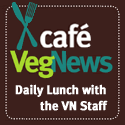
 The Summary: Happy Friday everyone! We have now reached the end of our reading and discussion of Veganist by Kathy Freston, and thanks to Crystal and lulu for participating this week. We will be taking a break next week from the Book Club, which will give you time to get started on our April read, Vegan's Daily Companion by Colleen Patrick-Goudreau. We have signed copies on the VN Store, so be sure to get your copy before the discussion begins!
The Summary: Happy Friday everyone! We have now reached the end of our reading and discussion of Veganist by Kathy Freston, and thanks to Crystal and lulu for participating this week. We will be taking a break next week from the Book Club, which will give you time to get started on our April read, Vegan's Daily Companion by Colleen Patrick-Goudreau. We have signed copies on the VN Store, so be sure to get your copy before the discussion begins!Now to the Q+A with Kathy Freston! Kathy generously lent her time to answer six of the top questions I received from our readers. Here are the questions with Kathy's responses. A big thanks to Kathy for sharing her thoughts with us here. Happy reading and have a great weekend!
Catherine: I am "leaning" into veganism as you suggest. Over the last four weeks since I've read your book, I would say that I am leaning pretty hard! My challenge is my 16-year-old son. He truly believes that eating meat makes him a man. In fact, he thinks the more meat he can eat, the more manly he is. I've thrown out some of the horrors of the factory farms and slaughterhouses, but he tunes it out. I'm looking for any suggestions to try to reach my son and help him to understand the consequences to his own health, the animals he is eating, the planet, the people that have to work in the environment that produces the meat, etc. Do you have any suggestions?
Kathy: Bravo you for leaning in! Well, you have a two-fold issue with your son. One is that he's a teenager, and it's his job right now to rail against his parents and go his own way (I say that only half jokingly). The second is that pushing someone to see things the way we see them never works, it only pushes them away. How would you feel if someone were trying to impress their views on you; wouldn't you just get annoyed and resist even more? I would let the ethical side of the conversation just rest for a while. Your son might be interested in seeing how really fierce athletes like Mac Danzig (UFC), John Salley, Tony Gonzalez, or even Mike Tyson eat in order to be fast on their feet and recover quickly. They all attribute their strength and success in sports to being vegan (or veganish). This way, you've caught his interest, and he might be more willing to give meat a rest here and there. You can also win him over with hearty meals, like tacos with Gardein beefless tips; black bean burritos with guacamole, vegan sour cream, and Daiya cheese; or quinoa pasta with meatless meatballs and tomato sauce. In time, the ethical awareness will come (for many guys, it's a girlfriend that turns that light on), but for now just feed him well!
Jennifer: The personal stories in each Promise section are great. How did you find these particular people?
Kathy: The personal stories just streamed in—it's as if the book just wanted to be written! Some came from the doctors and nutritional scientists that I spoke with—those guys have changed so many patients' lives, so it was a matter of finding the people who wrote their stories well. And the undercover investigators and rescuers came to me through the different organizations like the Humane Society of the US, PETA, Farm Sanctuary, and Mercy for Animals. One of the leads actually came from someone at VegNews! It's a tight community, those who give their lives to animal advocacy, and everyone in it is so willing to help wherever they can.
Michael P: Which part of the book was your favorite to write and why? Which was most difficult and why?
Kathy: Hey Michael! I loved writing the afterward, actually, because that is all about how to make the shift. I love helping people find their way as they lean in to being vegan or veganish. I know what their questions and concerns will be because I felt it all myself when I began my journey into conscious eating. It can be overwhelming when you are new to the idea, so I love making it easy and practical. The hardest part was pulling together Promise 8, about reducing animal suffering. It kills me every time I read an account of what happens behind closed doors to animals destined to be our food. It slays me. But I figure that if the animals are going through it, the very least I can do is bear witness to it. And talk about it.
Karin: Who is the person who has surprised you most by leaning in to a vegan diet?
Kathy: I was really surprised to see President Bill Clinton go vegan! I mean, this is a southern man who clearly savored burgers and steaks every chance he could get his hands on one. And he's in those circles where it's not so easy to get vegan food (he's traveling and at conferences, working with diplomats, etc.). But he's a great icon to look to, because if he can change, anyone can!
Robyn: What's your all-time favorite meal?
Kathy: I love almost any kind of pasta. A big bowl of it, with a glass of red wine. Sheer heaven!
Anonymous: What are your plans post-Veganist?
Kathy: I have so many plans, but you never know what will work out! I'd love to do a TV show—make vegan fun and interesting and easy. And I always say I'm never going to write another book (because it's exhausting), but then I hear the little voice in my head spewing ideas and thoughts, and I know I have to abide! Anything that makes veganism more popular and accessible, I'm game.
Thanks again Kathy!
~VN Book Club Hostess Lyndsay Orwig
























